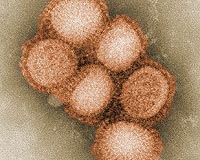| . |  |
. |
London (AFP) Aug 24, 2009 Millions of children will go back to school across Europe over the next few weeks despite fears that their return could help spark a second wave of swine flu infections. In Britain, the European country worst-hit by the virus, respected medical journal The Lancet recommended that schools remain shut after the summer holidays to stop the virus spreading as colder weather sets in. But the British government has decided there is insufficient evidence that delaying the start of the school term would help stop infections. "The advice is to remain open and make sure that the kids who are ill remain away from schools. There is an exception for special needs schools where kids can have underlying health problems," said a spokesman for the Department for Children, Schools and Families. After registering tens of thousands of infections every week, Britain has seen a sharp downturn in cases in August with an estimated 11,000 infections a week. More than 50 people have died after contracting swine flu in Britain, although most had a pre-existing medical condition. Many experts attributed the fall in infections to the fact that schools were closed for the summer, removing the conditions that helped the virus to spread through the sneezes and coughs of children kept together in close quarters. Some doctors fear that putting children back into classrooms at a time when the onset of colder, wetter weather ushers in the traditional flu season could lead to the virus regaining strength. "There is no greater way of facilitating the spread of swine flu than allowing children to mix in schools," said David Price, professor of primary care respiratory medicine at the University of Aberdeen in Scotland and a government advisor. "If we had a vaccine it would be a different matter, but given that we don't yet, it would be in my view foolhardy to allow children back to school. It's a discussion that needs to be had," he said on the Pulse medical website. Despite the fears, other European Union countries will take the same approach as Britain, and keep schools open. A report by the EU Health Security Committee, which draws on experts from the 27 member states, agreed unanimously that they "do not presently see the need to enact pre-emptive mass school closures." However, they said that closing an individual school after an outbreak of the A(H1N1) influenza among students is "beneficial to delay the transmission of the virus." In Britain, other voices have warned that shutting schools could have a disastrous economic effect because it would throw parents' childcare arrangements into disarray. Margaret Eaton, chairman of the Local Government Association, which represents local authorities, said: "Any decision to order the nationwide closure of schools would have to be taken extremely carefully. "It has a potentially massive knock-on effect because of the numbers who could be expected to stay at home to care for their children rather than going to work." However, in Ireland, where infection rates have been low, a quarter of parents supported the idea of keeping schools closed at the start of term, according to a survey by the Schooldays.ie website. Teachers' unions in Britain called, in a letter to schools minister Ed Balls, for their members to be the first to be vaccinated when the swine flu jab becomes available in the next few weeks. But under the current British government guidelines, teachers and children are not ranked among the most at-risk groups. People with pre-existing health conditions and pregnant women will be vaccinated first. Share This Article With Planet Earth
Related Links Epidemics on Earth - Bird Flu, HIV/AIDS, Ebola
 Swine virus more directly lethal than seasonal flu: scientist
Swine virus more directly lethal than seasonal flu: scientistParis (AFP) Aug 24, 2009 People who die after getting swine flu are up to 100 times more likely, compared to seasonal flu, to have been killed by the virus itself rather than secondary causes, a top French researcher said Monday. The findings -- published on a research-sharing platform, PLoS Currents: Influenza, vetted by flu experts -- could help health officials manage critical care resources if infection rates ... read more |
|
| The content herein, unless otherwise known to be public domain, are Copyright 1995-2009 - SpaceDaily. AFP and UPI Wire Stories are copyright Agence France-Presse and United Press International. ESA Portal Reports are copyright European Space Agency. All NASA sourced material is public domain. Additional copyrights may apply in whole or part to other bona fide parties. Advertising does not imply endorsement,agreement or approval of any opinions, statements or information provided by SpaceDaily on any Web page published or hosted by SpaceDaily. Privacy Statement |